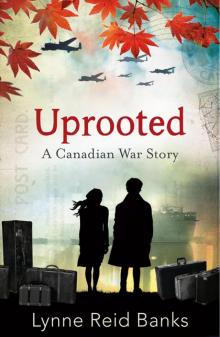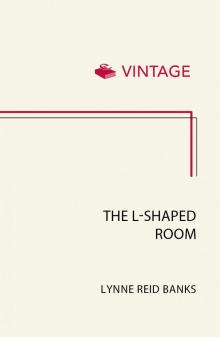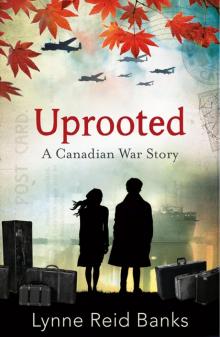- Home
- Lynne Reid Banks
The L-Shaped Room Page 2
The L-Shaped Room Read online
Page 2
‘You’re going, then.’ His voice had that gasp in it that comes after a lot of crying.
I didn’t answer. I wished he’d go away. I thought if he stayed I’d have to tell him that we’d let him catch us purposely because we wanted to rub it in that we were normal and that he disgusted us. He didn’t disgust me now; I disgusted myself. But he made it worse, standing there so defencelessly with his red eyes and hurt mouth. I rolled up the stained towel with my greasepaint in it and put it in the top tray of the trunk with my shoes. Then I picked the tray up. It was quite heavy.
‘Let me help with that.’
‘No,’ I said sharply. ‘Leave it alone.’
I put the tray on top of my things in the trunk and closed down the lid.
Behind me, he gasped again and said, ‘Please don’t go.’
I faced him so that he could see the scratches. ‘How can I stay after this?’ I said. He looked at me. His soft, helpless face seemed to shiver. I felt sick again.
‘Have you put something on them?’
‘Yes,’ I said, ‘don’t worry, I’m not going to risk getting blood poisoning.’ His face became a shade more wretched, if possible, which was what I’d wanted. I wanted to punish him for making me feel so guilty.
He began to cry again, quite openly. He came towards me with his face screwed up and put his arms round me and sobbed, ‘Please, don’t go, I’ll never forgive myself, please …’ As I stood there with him hanging on to me, pleading and crying, I could imagine how, in a day or so, I would relive this scene and wish I had petted and comforted him and forgiven him and agreed to stay, making it all his fault. But at this moment I knew it was my fault, and so I stood there with my arms not moving to cuddle him and what I said was, ‘Will you ask two of the men to help me out with my trunk?’ And the way I said ‘men’ stopped his pleading because it was so insulting, and he let me go and walked out with something like dignity.
So I left the company, and as I’d expected I regretted it next day, but it was too late then. I gave a week’s notice at my digs and sat around in them wondering where I would go when it expired because the season wasn’t due to end for another two months and I couldn’t go back to my father before that. In a small town like that everyone knows the local actors and speaks to them in shops; there was no question there of having no curiosity – everyone was bursting with it, starting with my landlady and spreading to the street my digs were in and from there all over town. I couldn’t go out for a walk without being asked a hundred times why I’d left the company, and what had happened to my face, and was it true what Mrs Whatnot said, that this or that? The most widely accepted story was that I’d had a fight with one of the other actresses over a part, and I didn’t correct it. As to what I was going to do, I didn’t know, I only knew I couldn’t go home for two more months.
The actor who had thought himself in love with me wasn’t in love with me at all, and I wasn’t in love with him either. We discovered that when he came to see me. I wasn’t glad to see him although I tried to be, and he felt the same. We sat in the kitchen of my digs on the blue plush settee in front of the stove. We talked and drank the tea which my landlady always made for every visitor, and we didn’t touch each other or look at each other much, because we felt like two people who’ve committed a crime together but are trying to behave as if it weren’t important or had never happened.
He asked if I were going back to London and I said no, I couldn’t tell Father what had really happened and I couldn’t tell him a lie either because he always knew when I was lying. So the actor said, ‘Well, what are you going to do?’ And I said, ‘I’ll have to stay in this town because of the postmark on letters to Father.’ That was the first time I’d thought of that.
The actor asked what I was going to live on, which was a good question, because at least the rep had paid for my digs as part of the get-out and that had included one meal a day and all the tea I could drink. I said, ‘Obviously I’ll have to get a job,’ and the actor said, ‘You mean, not acting?’–incredulously, as if there weren’t any other kinds of job, which is how all actors feel to begin with, and how I felt too until that moment.
That night after it was dark I went for a walk to a part of town I’d never been to, on the other side of the river. People around there didn’t go to the theatre much and nobody knew me. I saw a notice in a café window saying they needed a waitress. I went in and sat down at a table, and watched the proprietor wiping the table-tops with a damp cloth. They weren’t Formica. They were coloured oilcloth tacked under at the corners. There was a cruet and a bottle of Worcester Sauce on each table, and a bowl of sugar. I couldn’t decide whether I should apply for the job or not, and I thought, I’ll order some coffee and if the cup’s cracked or there’s lipstick on it I’ll pay and walk out. It wasn’t that I cared too much about things like that; at the theatre we’d drunk coffee out of jam jars and cooked in paint tins on top of the remains of what the person before had cooked; it was just a way of deciding whether to ask for the job or not, like tossing a coin.
I ordered the coffee and it came. There was none spilled in the saucer and the cup might have been brand new for all the cracks or lipstick I found on it, though I looked carefully, half-hoping there would be. I drank the coffee and then went to the counter and applied for the job.
I’d played the daughter in a Yorkshire comedy the week before and I told the proprietor my name was Millie Braithewaite, speaking in a Yorkshire accent, but he said who did I think I was having on? I was the young lass from the theatre, the one all the pother was about; he’d spotted me right off as soon as I came in.
It took a bit of talking to convince him that I needed the job, and that I could do it if he gave it to me, but in the end he said I could start tomorrow. A day’s unpaid trial and after that a week’s notice on either side. I was to get £4 10s. a week, my hours being from ten in the morning till the customers went home at night. Four-ten sounded like a lot and I was very grateful, thinking he’d engaged me out of pity. What I didn’t realize was that what I’d done was the local equivalent of Ingrid Bergman getting a job as a hat-check girl in the Regent Palace Hotel right after the Rossellini scandal.
The first week was a nightmare. The whole town came across the river to have a look at me. The café had never done such business. The proprietor gave up wiping the tables between customers: there wasn’t time. He just stood behind the cash-register and grinned whenever he caught my eye.
I didn’t try to hate all the interested gawpers who sat and joked and whispered while I fetched their egg and chips, tea, Tizer, and bread and butter; I just hated the proprietor. I hated him quietly and steadily while I worked as I had never worked in my life before.
Every night I would hang my overall away in a little cupboard off the café kitchen and look at my face in a bit of mirror propped over a coat-hook. I would think about how I hated the proprietor because he was fat and because he had engaged me not out of pity but as a sort of side-show, and I would watch the two scratch-marks standing out redly as the humiliation thickened in my throat and the tears of tiredness came at last.
I would tell myself to go and tell him I wouldn’t be coming next day; but at the beginning I thought it was too soon to give up, and after the third day I was too tired to say anything to anyone. I told myself I’d stick it till the end of the week and get my four-ten out of him before I told him I was never coming back.
Saturday was the worst day of all. Apart from the looks and remarks, the work itself went on for nearly twelve hours without a break, except half an hour at seven when I was supposed to have supper. I sat down in the smoky, greasy kitchen, and pushed the plate of fish and chips away and put my head down on my arms where it had been. I didn’t go to sleep. I just lay there thinking over and over again, Only five more hours. Only five more hours. I had no other thought in my head at all. When the proprietor put his hand on my shoulder to tell me my half-hour was up, I opened my eyes and sat up suddenly. I must have been partly asl
eep because everything reeled and sparkled for a minute and the proprietor’s face in the middle of it looked exactly like my father’s.
It was after eleven when the last of them went. After the door slammed behind him there was a beautiful ringing silence. I stood in the middle of it and it was like bathing in warm milk. Then the proprietor opened the cash-register to put in the last customer’s eightpence-halfpenny and I thought that breaking that silence was the best reason I’d ever had to hate him.
I walked to him, where he stood behind the counter, gloating over the overflowing cash-drawer, and said: ‘While you’ve got that drawer open, may I have my wages, please?’
He counted out my money, less insurance, very slowly, and, it seemed to me, grudgingly. Then he passed it over to me, but when I reached to take it he drew it back. He held it where I couldn’t reach it, and weighed it in his hand, smiling at me.
I could feel the scratches burning on my face and I saw him looking at them. I wanted to open my mouth and scream until I had no lungs left, to scream right into his face until just the noise made him stop smiling that fat smile. But, unbelievably, he couldn’t see from my eyes how much I hated him, because he said in quite an ordinary voice, ‘Ah well, I suppose you’ve earned it,’ and he gave it to me.
As soon as it was in my hand I saw that his smile was just the smile of a fat Yorkshireman who’s had a good week’s business and is having a joke to celebrate. It wasn’t a torturer’s smile at his victim. I put the money in my pocket and walked round the end of the counter to go into the kitchen for my coat. Then I remembered I hadn’t told him yet that I wasn’t coming in again. I turned to him but before I could say anything he said, ‘You could have thirty bob more if you’d come in tomorrow.’
‘Tomorrow’s Sunday,’ I said stupidly.
‘Well, I know you’re tired. But you won’t be a novelty for ever. We want to strike while iron’s hot. Then you can take it easy when the rush dies down.’
There was quite a long pause and I must have started swaying on my feet because his expression changed and he said, ‘Are you all right, lass? You look a bit poorly.’ I suddenly shouted at him, ‘You can take your thirty bob and stuff it, you bloody thick-skinned slave-driver!’
He looked at me for a second with his mouth open, and then he started to laugh. He laughed until he grew weak and had to lean on the counter and wipe his eyes. ‘Ee well,’ he said at last, ‘Ee well, happen you’re right. Happen it’s a bit much to ask. Take your thirty bob and stuff it, eh? Ee, you’ll do, lass, you will. See you Monday. Don’t forget to turn lights out and lock door.’ And he went out, chuckling and shaking his head.
I went into the back of the café and took off my overall and put my coat on. Then I looked at myself in the piece of mirror as I always did. The red had died right out of the marks: they showed, but only because they had scabs on them. The skin round them was clear and they had a healthy look. I thought it was Saturday night, and at the theatre they’d be striking the set after the last performance of this week’s play. They would all be scrambling about on ladders and uncleating the flats and packing the borrowed props in boxes ready to be returned next day to their owners. The new little girl stage manager would be brewing coffee on the gas-ring in the cramped scene-dock, the ring that was used for cooking meals and heating up the foul-smelling size and boiling the kettle for tea. Throughout the work of the night, someone would keep feeding records to the panatrope.
I wondered what the actor would be doing. He hadn’t been to see me in the café. I had hoped he wouldn’t come, but when he didn’t I had been disappointed. I hadn’t seen any of the other rep people since the night I left. My landlady told me they’d got a new girl from Birmingham to replace me. During the week I’d been in the café, she’d been rehearsing Christina in The Silver Cord. On Mondays she would be playing it. It was two-for-the-price-of-one on Mondays to make sure of a good first-night house; there were a lot of regulars who always came on Mondays and didn’t mind about the missed lighting cues or prompts or people trying to open doors the wrong way, because they’d got in for half-price. It was always a full house on Mondays, even for a drama. I wondered if the new girl understood what a wonderful and difficult part Christina was.
I left the café, turning out the lights and locking the door. Then I walked back to my digs and asked my landlady if I could stay on. She was very pleased because not many people wanted that sort of accommodation and she hadn’t found anyone else. She said I looked right fagged and that he had no business keeping me so late. She got a hot potato pie out of the warmer by the stove and dished some of it on to a plate of cold meat. I felt calm and very hungry; my landlady sat on the arm of the plush settee and chatted to me while I ate, passing me the ketchup and the bread and butter and the raisin turnovers to follow. It was very nice to be waited on for a change. She mentioned that her sister had happened to be passing the café and had popped in to see how I was getting on. She said her sister had said that I worked like she didn’t know what, and that I’d make a grand waitress if only I smiled a bit more. She said I always smiled so lovely when I was taking a funny part in the plays, but that I looked so rain-faced in the café it fair put her off her poached eggs. I said I quite saw how it could. Then we both had a cup of tea and my landlady made me a hot water bottle because she said I looked shivery. She’d let me sleep in in the morning, she said; I could sleep all day if I liked. She’d bring my lunch up on a tray. I thanked her and gave her a kiss and she said she was right glad I was staying.
I slept until lunchtime the following day and went for a walk in the afternoon. When the neighbours shouted to me out of their windows to know how I was getting on in t’caff, I shouted back that I was getting on fine, and why didn’t they drop in some time. That evening I went to a film and got to bed early and read for a while before going to sleep. The next day I went back to the café.
It went on being hard work, but there was never another week like the first, chiefly because I didn’t mind it any more. I learned a lot, specially the week the cook was off with her sinus. I’d never cooked before beyond heating things up out of tins, but now I learned how to make batter that fried golden, and how to mix welsh rarebits with dry mustard and grill them eight at a time, and how to make an omelette such as the customers had never tasted before because I used a French recipe out of a book I borrowed from the library. From this I also learned how to make baked beans taste special by adding chopped onion and brown sugar and some garlic salt, which had to be ordered from York by our local grocer. Not everybody liked it at first, but I didn’t tell them what the funny taste was, and after a bit people were coming specially, not to look at me, but to eat.
I got on very well with the proprietor. I used to think up rich new insults to make him laugh. He thought I was a proper caution, but he said I was a good worker too. The week I was doing the cooking he got worried by the unusual smells that came out of the kitchen, but when custom increased and regulars came in asking for this or that ‘cooked the new way’, he raised my wages to £6 and let me help with the cooking even after the cook came back. She didn’t care for the arrangement much, but when she complained he told her she could like it or lump it.
I wrote to my father every week and told him what play was being put on, and I invented other things to tell him and hoped he wouldn’t notice that I’d stopped sending cuttings from the local paper. I didn’t read the reviews and I didn’t go near the theatre.
One night the actor came into the café. He was leaving the company and going back to London, he said. There was something rotten about the feeling in the company that he couldn’t stand any more. The new girl had fallen in love with Malcolm. The actor had tried to tell her it was no use, but she wouldn’t believe him. The actor told me the interesting thing was that Malcolm found it disgusting that a woman should want him, and he was quite vicious to her, screaming insults one minute and sneering with sarcasm the next. The girl kept having hysterics and threatening to kill h
erself. The actor said the whole atmosphere was unbearable; in fact he was fed up with the theatre generally and was going to try to get a job in journalism. He asked if I was all right and I said I was. He said would I have dinner with him when I got back to town, if he had any money by then. I said I’d see. There didn’t seem anything else to say and there were customers waiting, so he got up to go.
‘Good-bye,’ he said. ‘You’re not missing much. The houses are dropping off and we’re doing one Aldwych farce after another.’
‘I know,’ I said.
He hesitated, then kissed my cheek. Not the scratched one, the other.
‘What was she like as Christina?’ I asked.
‘Ghastly. She played her like a games mistress.’
My spirits rose suddenly and I laughed. ‘Good-bye,’ I said. ‘Good luck. I really would like to have dinner with you.’
But I never did. By the time I got back to London, he was engaged to be married.
Chapter 2
I WAS sitting in Frank’s in Fulham, sipping coffee and remembering all this, for two reasons; one I didn’t admit to myself, but it was to do with the actor. The other was because Frank’s reminded me of this other place. I’d stayed on there for two months, till it was time to go back to London. I could have gone three weeks earlier because the company ended its season before it had meant to. But the proprietor offered me £6 10s. a week for as long as I’d stay on. £6 10s. wasn’t bad pay for a waitress in those days; for the first time in my life I was saving money. So I went on for another three weeks, laying tables, cooking the specials, carrying food and cups of tea to the tables; and I went on writing lies to my father.
When I finally left, the proprietor gave me a present of £2 which brought my savings up to £15. I was filled with confidence. I remembered coming home in the train and listening to the wheels saying ‘I can do anything – I can do anything –’ Sitting with Frank’s coffee fighting the cold inner emptiness, I thought of that feeling of triumph and excitement, trying to recreate it, but it was like being stone cold and trying to get warm by remembering what being warm was like. I picked up a teaspoon and let it drum on the table to the rhythm of those six-year-old wheels and whispered to myself, ‘I can do anything … I can do anything …’

 Two Is Lonely
Two Is Lonely Uprooted - a Canadian War Story
Uprooted - a Canadian War Story The Backward Shadow
The Backward Shadow Harry the Poisonous Centipede: A Story to Make You Squirm
Harry the Poisonous Centipede: A Story to Make You Squirm The Secret of the Indian (The Indian in the Cupboard)
The Secret of the Indian (The Indian in the Cupboard) The L-Shaped Room
The L-Shaped Room The Mystery of the Cupboard
The Mystery of the Cupboard The Farthest-Away Mountain
The Farthest-Away Mountain Harry the Poisonous Centipede Goes to Sea
Harry the Poisonous Centipede Goes to Sea The Fairy Rebel
The Fairy Rebel Harry the Poisonous Centipede's Big Adventure: Another Story to Make You Squirm
Harry the Poisonous Centipede's Big Adventure: Another Story to Make You Squirm The Indian in the Cupboard
The Indian in the Cupboard The Return of the Indian
The Return of the Indian I, Houdini
I, Houdini The Key to the Indian
The Key to the Indian The Warning Bell
The Warning Bell Alice by Accident
Alice by Accident Uprooted
Uprooted Writing On the Wall
Writing On the Wall The Adventures of King Midas (Red Storybook)
The Adventures of King Midas (Red Storybook) Harry the Poisonous Centipede's Big Adventure
Harry the Poisonous Centipede's Big Adventure Harry the Poisonous Centipede
Harry the Poisonous Centipede The Dungeon
The Dungeon Bad Cat, Good Cat
Bad Cat, Good Cat The Indian in the Cupboard (Essential Modern Classics, Book 1)
The Indian in the Cupboard (Essential Modern Classics, Book 1) Tiger, Tiger
Tiger, Tiger